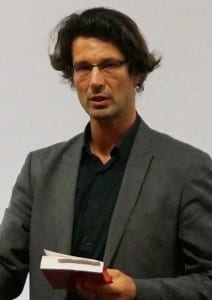Translating the poem: Henri Meschonnic’s poetics of translating
By ucyow3c, on 28 October 2014
![]()
Written by Silvia Kadiu (PhD student, UCL Centre for Multidisciplinary and Intercultural Inquiry)

Dr Marko Pajević
Translating poetry is a notoriously difficult, if not entirely impossible, task. Yet, poems are translated into other languages all the time. Why is poetry such a challenging genre to translate? What does this impossibility tell us about the nature of language? And how can one overcome it in practice? Dr Marko Pajević’s exploration of Henri Meschonnic’s philosophy of language and particular way of thinking translation, given as part of the Translation in History lecture series, provided compelling answers to these questions.
His comprehensive and clearly-organised lecture took the audience on an inspiring meander into Meschonnic’s thinking. After introducing Meschonnic and his work, Dr Pajević then discussed the linguistic philosophies of Emile Benveniste and Wilhelm von Humboldt, before explaining how they influenced and shaped Meschonnic’s poetics, politics and ethics of translating. Continuously navigating between theoretical and practical considerations, Dr Pajević’s presentation exemplified the central idea of Meschonnic’s poetics: the inseparability of form and content.
Henri Meschonnic (1932-2009) is a relatively unknown figure in the Anglophone world. A French poet, linguist and translator, he is the author of over a dozen texts about translation, only one of which has been translated into English: Ethics and Politics of Translating (2011). Dr Pajević explained the reasons for this lack of recognition, stressing Meschonnic’s controversial positioning and deliberate isolation throughout his career, especially in opposing influential movements such as hermeneutics, structuralism and deconstruction.
 Close
Close




